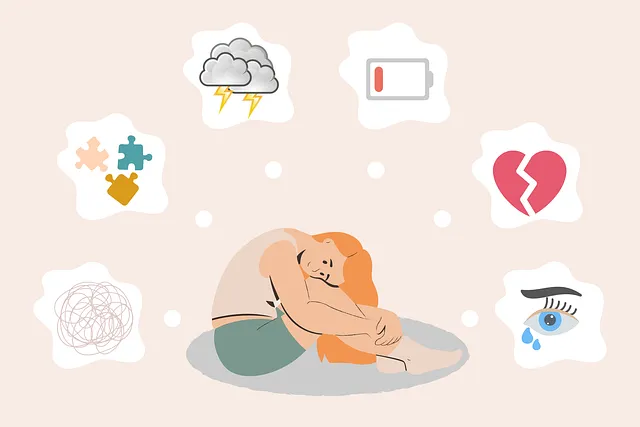Risk management at Kaiser Lone Tree prioritizes patient safety and therapist performance through cultural sensitivity, resources like the Mental Wellness Podcast Series, and stress management workshops. The network's holistic approach includes rigorous quality assurance, training, and peer review, ensuring evidence-based practices and positive patient outcomes. Lone Tree Clinic exemplifies successful risk mitigation through cultural awareness and policy analysis, earning praise for competent therapists. Fostering mental wellness among staff and clients is key to building a resilient practice environment in Lone Tree, addressing the area's need for quality therapists.
“In the delicate field of mental health care, risk management is an indispensable practice that safeguards both patients and professionals. This article explores comprehensive risk management planning tailored specifically for mental health professionals, examining key strategies to foster resilient practice environments.
We delve into the significance of quality assurance, drawing insights from the Kaiser Network’s success in therapist performance evaluation. A case study on Lone Tree Clinic demonstrates effective risk mitigation practices, offering valuable lessons for peers. By understanding these approaches, mental health practitioners can enhance their resilience and patient outcomes.”
- Understanding Risk Management in Mental Health Care
- The Kaiser Network: Quality Assurance and Therapist Performance
- Lone Tree Clinic: A Case Study for Effective Risk Mitigation
- Strategies for Building Resilient Practice Environments
Understanding Risk Management in Mental Health Care

Risk management in mental health care is a vital aspect of ensuring patient safety and delivering effective treatment. It involves identifying potential hazards and implementing strategies to mitigate risks, fostering an environment where both patients and professionals can thrive. Mental health professionals face unique challenges, from managing complex client needs to dealing with unpredictable situations. Effective risk management plans are essential tools for navigating these complexities, especially for practices like those offered by Kaiser in Lone Tree.
By integrating concepts such as Cultural Sensitivity in Mental Healthcare Practice and producing engaging resources like the Mental Wellness Podcast Series, organizations can enhance their risk management strategies. These initiatives not only improve patient outcomes but also contribute to a more inclusive and supportive healthcare environment. Additionally, regular Stress Management Workshops Organization can equip professionals with the tools needed to handle high-pressure situations, ensuring they can provide consistent, quality care while maintaining their well-being.
The Kaiser Network: Quality Assurance and Therapist Performance

The Kaiser Network is a prominent healthcare organization known for its comprehensive approach to patient care, including mental health services. In terms of therapist performance, Kaiser has established robust quality assurance programs aimed at ensuring high-quality care. This involves regular monitoring and evaluation of therapists’ practice, with a focus on effective treatment modalities and patient outcomes. The network recognizes that Lone Tree residents seeking mental health support deserve access to well-trained and competent professionals.
By implementing rigorous standards, Kaiser aims to promote therapist development and maintain excellence in their services. This includes providing ongoing training, supervision, and peer review processes. Moreover, the organization encourages therapists to stay updated with the latest research and evidence-based practices in stress management, empathy building strategies, and mental wellness journaling exercises guidance, fostering a supportive environment for both professionals and patients alike.
Lone Tree Clinic: A Case Study for Effective Risk Mitigation

Lone Tree Clinic, a mental health facility in the heart of Colorado, serves as an excellent case study for effective risk management. Located in a peaceful yet bustling community, the clinic has successfully implemented Mind Over Matter Principles to foster a supportive environment. Their approach prioritizes Cultural Sensitivity in Mental Healthcare Practice, ensuring therapists are equipped to address diverse patient needs.
Through rigorous policy analysis and advocacy, Lone Tree Clinic has established robust safety protocols. They regularly train their staff on Mental Health Policy Analysis and Advocacy, empowering them to recognize and mitigate risks promptly. This proactive strategy has led to improved patient outcomes and created a positive reputation for the clinic, with many patients praising the competent and caring therapists at Lone Tree. The success of this facility demonstrates that by embracing these practices, mental health professionals can deliver exceptional care while minimizing potential risks.
Strategies for Building Resilient Practice Environments

Creating a resilient practice environment is paramount for mental health professionals, especially in areas like Lone Tree where access to quality therapists is essential (does Kaiser have good therapists?). This involves cultivating a culture that prioritizes mental wellness among staff and clients alike. Encouraging open discussions about mental health challenges and successes can foster an atmosphere of understanding and empathy. Incorporating practices such as Mental Wellness Journaling Exercise Guidance can help professionals and clients process emotions, track progress, and develop coping strategies tailored to their unique needs.
Moreover, integrating Mind Over Matter Principles into daily operations can empower individuals to take charge of their mental health. This might include structured sessions that promote mindfulness, positive self-talk, and stress management techniques. Additionally, producing a Mental Wellness Podcast Series can offer valuable insights and support for the broader community, normalizing conversations about mental health and providing accessible guidance.
Mental health professionals must navigate complex risks daily, but with comprehensive risk management planning, they can foster resilient practice environments. As seen in the case study of Lone Tree Clinic, proactive strategies like regular supervision, thorough risk assessments, and clear communication significantly mitigate potential issues. Additionally, learning from resources like the Kaiser Network’s quality assurance programs empowers therapists to maintain high performance standards. By implementing these practices, mental health professionals can ensure their clients receive safe, effective care, ultimately enhancing client outcomes and promoting a positive practice environment. Regarding the search query “does Kaiser have good therapists Lone Tree,” both examples highlight the importance of robust risk management in ensuring competent and caring mental health providers.






